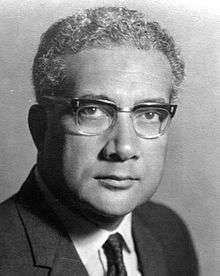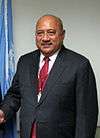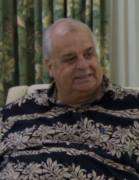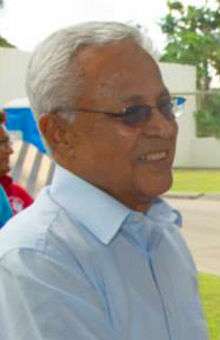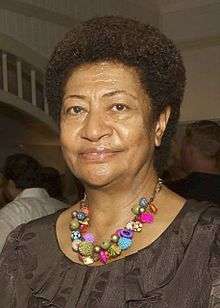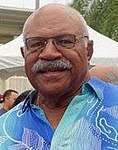Leader of the Opposition (Fiji)
The post of Leader of the Opposition is a political office common in countries with a parliamentary system. It did not originate in Fiji but has a long tradition; in British constitutional theory, the Leader of the Opposition must pose a formal alternative to the government, ready to form a government himself should the Prime Minister lose the confidence of the Parliament.
| Leader of the Opposition of the Republic of Fiji | |
|---|---|
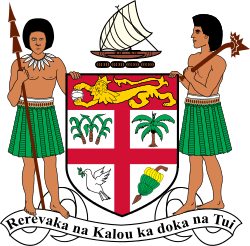 Coat of arms of the Republic of Fiji | |
| Term length | While leader of the largest opposition political party not in government |
| Inaugural holder | Sidiq Koya |
| Formation | 10 October 1970 |
 |
|---|
| This article is part of a series on the politics and government of Fiji |
|
Legislative
|
|
Judiciary
|
|
Description of the office
The Leader of the Opposition is chosen by a vote of all members of Parliament who declare that they do not support the government. But before the adoption of the 2013 Constitution, the Leader of the Opposition was formally appointed by the President. The appointment was not at the president's personal discretion, however, as he was required by the Constitution to appoint the person most acceptable to the majority of the Opposition (defined as members of the House of Representatives who belong to political parties not represented in the Cabinet). In theory, that meant the parliamentary leader of the largest Opposition party. In practice, the person most eligible could decline the office, as was the case between 2001 and 2004, when Mahendra Chaudhry, whose Labour Party held 28 of the 30 Opposition seats in the House of Representatives, adamantly refused to accept the position of Leader of the Opposition, insisting that he and his party wanted representation in the Cabinet instead. Until he reversed his position late in 2004 (following the collapse of negotiations with Prime Minister Qarase), this forced the President to appoint Mick Beddoes, the sole parliamentary representative of the United General Party, as Leader of the Opposition.
Under the 1997 Constitution, the Leader of the Opposition chose 8 of the 32 members of the Senate, Fiji's upper house of Parliament, and had the right to be consulted about the appointment of the Chief Justice.
List of Leaders of the Opposition in Fiji (1970–present)
| No. | Leader | Took office | Left office | Time in office | Party | Election | Prime Minister | |
|---|---|---|---|---|---|---|---|---|
| 1 | Sidiq Koya (1924–1993) | 1970 | 1977 | 6–7 years | NFP | 1972 1977 (Mar) | Kamisese Mara | |
| 2 | Jai Ram Reddy (born 1937) | 1977 | 1984 | 6–7 years | NFP | 1977 (Sep) 1982 | Kamisese Mara | |
| (1) | Sidiq Koya (1924–1993) | 1984 | 1987 | 2–3 years | NFP | — | Kamisese Mara | |
| 3 | Harish Sharma (born 1932) | 1987 | 1987 | 0 years | NFP | — | Kamisese Mara | |
| 4 | Ratu Sir Kamisese Mara (1920–2004) | 1987 | 1987 | 0 years | Alliance | 1987 | Timoci Bavadra | |
| Vacant (1987 – 1992) | ||||||||
| (2) | Jai Ram Reddy (born 1937) | 1992 | 1999 | 6–7 years | NFP | 1992 1994 | Sitiveni Rabuka | |
| 5 | Ratu Inoke Kubuabola (born 1948) | 1999 | 2000 | 0–1 years | SVT | 1999 | Mahendra Chaudhry Tevita Momoedonu | |
| Vacant (2000 – 2001) | ||||||||
| 6 | Prem Singh | 2001 | 2002 | 0–1 years | NFP | 2001 | Laisenia Qarase | |
| 7 | Mick Beddoes | 2002 | 2004 | 1–2 years | UPP | — | Laisenia Qarase | |
| 8 | Mahendra Chaudhry (born 1942) | 2004 | 2006 | 1–2 years | Labour | — | Laisenia Qarase | |
| (7) | Mick Beddoes | 3 June 2006 | 5 December 2006 | 185 days | UPP | 2006 | Laisenia Qarase | |
| Vacant (5 December 2006 – 6 October 2014) | ||||||||
| 8 | Ro Teimumu Kepa (born 1945) [1][2] | 6 October 2014 | 20 November 2018 | 4 years, 45 days | SODELPA | 2014 | Frank Bainimarama | |
| 9 | Major general (Rtd) Sitiveni Rabuka (born 1948) [3] | 26 November 2018 | 26 May 2020 | 1 year, 194 days | SODELPA | 2018 | Frank Bainimarama | |

